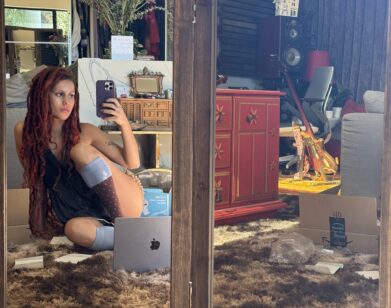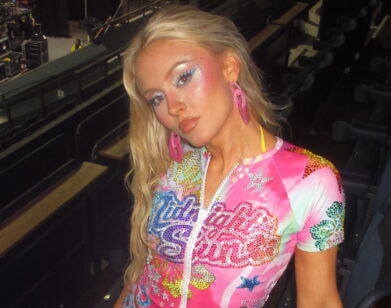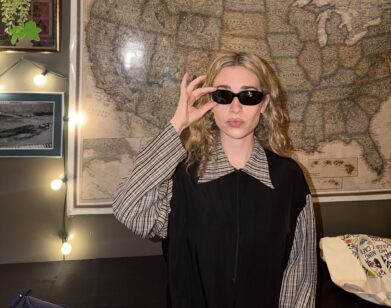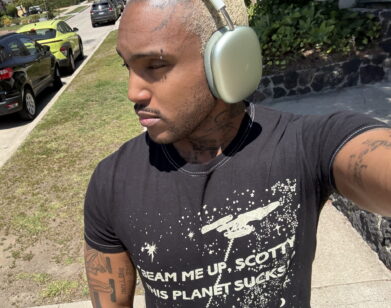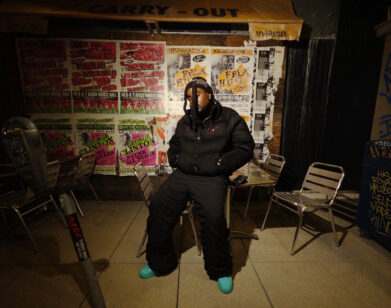Dawes’ Time Has Come
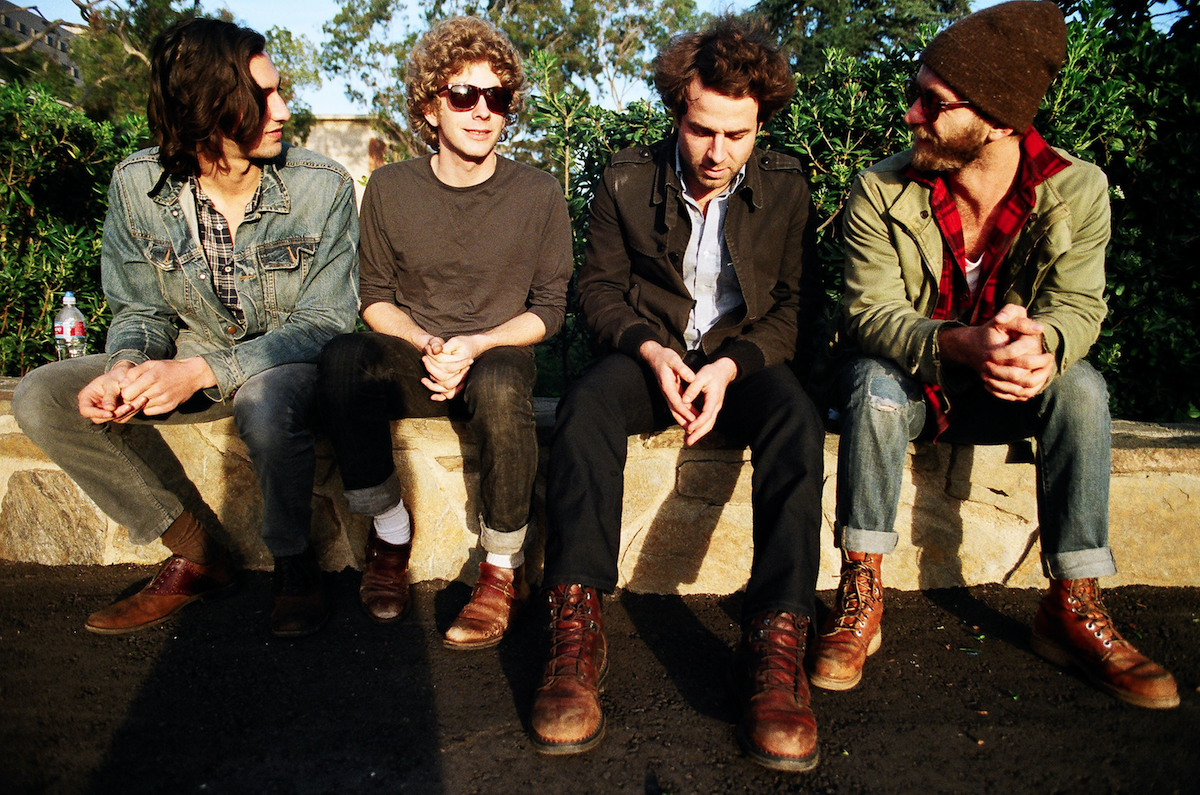
TAYLOR GOLDSMITH (SECOND FROM RIGHT) AND HIS DAWES BANDMATES
PHOTO COURTESY OF KEVIN HAYS
Taylor Goldsmith writes some serious songs. As songsmith and lead singer of the LA folk-rock outfit Dawes, Goldsmith has the kind of sit-up-and-take-notice chops that caused Esquire to dub him “the best young songwriter in America.” Yet the singer will be the first to tell you that Dawes, which is currently touring in support of their latest record, Nothing Is Wrong, is more a sum of its parts than a single entity.
Anxious to find out how a little-known group with only two albums under its belt could be picked as a backing band for such greats as Jackson Browne and Robbie Robertson, we caught up with Goldsmith as Dawes was making their way across the Kentucky state line.
JEFF OLOIZIA: You guys have been opening shows for quite a while now. Is there a part of you that wishes you could still catch people by surprise?
TAYLOR GOLDSMITH: How do you mean?
OLOIZIA: I’m just thinking of a lot of the shows I’ve gone to recently, and bands that I’ve discovered have been openers that I had never even heard of.
GOLDSMITH: Yeah, that’s something that we really see a lot of value in. I know a lot of bands that will make their first record and get to a certain level, and then when the second record comes out, they can start where they left off as a headlining act playing in front of a certain number of people, or they can go back out and make a lot less money and open for people. I feel like if you go out and just go right back into that headlining stuff, you’re playing to the converted. We kind of, on purpose, were like, “Let’s make this summer about supporting people. Let’s realize that we’re going to make less money, but let’s try to get as many fans from as many kind of demographics as we can.” And I feel really lucky that our music, right now at least, exists in this world where we can open for artists like M. Ward or Bright Eyes, and then on the same side of that open for Alison Krauss.
OLOIZIA: That’s pretty awesome. You’ve also gotten to play with some really amazing musicians. The one that stands out, to me, is Robbie Robertson. What was it like to work with him?
GOLDSMITH: It was awesome. The fact that he chose us said a lot about where his priorities are at, because I feel like he could afford anybody. He could afford any guitar player—any band—and they could be the best band of players in the world. But instead he chose a single unit, and I’m very aware of the fact that I’m not the best guitar player in the world, but I do have more experience playing with Wylie [Gelber], our bass player, and Griffin [Goldsmith], our drummer, and Tay [Strathairn], our piano player, than any other guitar player. So for Robbie to recognize the value of something like that, it really just reminds you that he was a member of The Band, and that’s what they were all about.
OLOIZIA: Did you ever have to fight the temptation to get him to jam out to some old Band songs?
GOLDSMITH: There was one soundcheck we were doing for a TV show where we started playing a blues shuffle kind of thing, and he started playing lead guitar, and it was like, “Holy shit, there’s Robbie Robertson.” No one else was going to play like that.
OLOIZIA: I’ve got to ask you—if Dawes could hop in its DeLorean and travel back in time to play The Last Waltz, what song would you play?
GOLDSMITH: [laughs] I remember in that movie when they play “It Makes No Difference”—that performance of that song is out of control. Especially because, I guess, Richard [Manuel] was only half-there at that point, supposedly.
OLOIZIA: There’s still quite a bit of debate about the use of drugs during that era and whether they helped or hindered the creative process. What side of that argument do you come down on?
GOLDSMITH: Well, it’s definitely not our scene, but that doesn’t necessarily mean I don’t condone it. Slash is one of the greatest guitar players I’ve ever heard, and it’s amazing when you hear about all the crazy stuff he’s done. That album, Appetite for Destruction, just doesn’t have the same meaning without those experiences. But I, personally—you know, I’ve never done any hard drugs, which might disappoint some people. It’s just a different thing. Our music is fueled more by good R&R than a late-night party.
OLOIZIA: There’s a pretty strong legacy in the LA rock scene. Do you ever feel like the press is missing the mark when they describe Dawes as a Laurel Canyon rock band?
GOLDSMITH: I don’t find it accurate, but I don’t get beat up over it. If someone were to say, “Oh, I wrote this thing about Dawes, and they’re part of the Laurel Canyon sound, so that must mean that they frequent Laurel Canyon and that all their musician friends and constantly singing and writing songs together in Laurel Canyon,” then it would be inaccurate. But if someone says, “Dawes is a Laurel Canyon band in the sense that there are influences drawn from James Taylor, Joni Mitchell, Crosby, Stills and Nash, Neil Young, and Jackson Browne,” then I could say, “OK, yeah, to a certain extent, totally.” Laurel Canyon, in a contemporary way, doesn’t exist like people might think it does. A lot of amazing people live up there, but it tends to be more families and business-based, because it’s an expensive place to live now.
OLOIZIA: You guys record on analog, which can be pretty difficult to edit. Do you ever listen to the records and think, “Man, I wish I had that one back?”
GOLDSMITH: I think that will always be the case. If I were to listen to the first or second record now and say, “Fuck yeah, we nailed it,” then you can probably expect the third record to sound just the same. I think it’s important to always stay critical. But rather than dwelling on it and wishing I could change something, it’s important to just take those lessons learned and those new notes and apply them to the next thing.
OLOIZIA: Will you road test new songs as they’re written?
GOLDSMITH: Oh yeah. I understand why some bands don’t like doing that, but for us it’s been very helpful and it hasn’t really backfired. I was nervous that our second record was—you know, you could hear the whole thing on YouTube before the album came out because we played it all live, but it ended up being something that people appreciated. I’m a big Grateful Dead fan, and when I heard “Looks Like Rain” off of Europe ’72, I was like, “Man, I’d love to have the studio version of this.” So I’m hoping that when people hear a live Dawes song on YouTube or at a show and then they get that studio version, hopefully they’re excited, rather than saying, “Oh man, I wanted completely new material I’ve never heard before.”
OLOIZIA: You’ve been posting some fan covers of Dawes songs on the band’s Twitter page. Got any favorites?
GOLDSMITH: There was this bluegrass version of “When My Time Comes” that was amazing. I was like, “Dang, this is should have been on our record.” When I got the first cover, I was sitting with Tay, our piano player, and I said, “Would it be shameless to invite people to send more of these and I’ll retweet them?” Because I only mean it in a way of like, “Hey, if you want other people to listen to you playing music, I’ll help you.” It’s not a lot, but we have 8,000 people following us. I get the biggest kick out of it, to hear words that I wrote and chords that I wrote being sung by somebody else. It’s a true honor, and it might sound intense, but it’s one of the most rewarding parts of the songwriting experience.
OLOIZIA: Being a band that records in analog, and having to make sure that everything is tight and ready to go before you record, is it worrying at all for you to see how it easy it is for people to put unrehearsed music out there for consumption?
GOLDSMITH: I think with the nature of the game being more competitive, it’s going to weed things out. I know a lot of bands, when we told them, “We’re going to go on tour for five months straight this summer,” [they] said, “You’re not going to make it.” And I thought, “If you operate like that, and you don’t have the confidence in your own band to be able to last five months straight, I feel like that’s an issue.” And also, in the fan, if you find out that four relevant artists are playing in your small town, and you have a job that you have to be at in the morning every day—if all four bands are playing in one week, you can’t go to all four shows. And so eventually the quality of the show, the dedication of the artist, and the strength of the material is going to dictate which band is still on tour in two years, and which band’s not.
OLOIZIA: It’s almost like musical natural selection.
GOLDSMITH: Exactly. I think that the oversaturation of that market right now will eventually start taking care of itself, where some bands are like, “We just don’t want to do it anymore,” and other bands say, “Things just keep getting better.” It just depends on where you bring your joy out of it. For us, people are like, “When you’re smiling and laughing and acting a fool onstage, is that because you’re just trying to entertain people and have a good show?” I don’t muster that up to try to impress an audience. We’re lucky because we are happiest when we’re onstage.
NOTHING IS WRONG IS OUT NOW. DAWES WILL BE PLAYING AT WEBSTER HALL TOMORROW NIGHT. FOR MORE ON THE BAND, VISIT THEIR WEBSITE.

